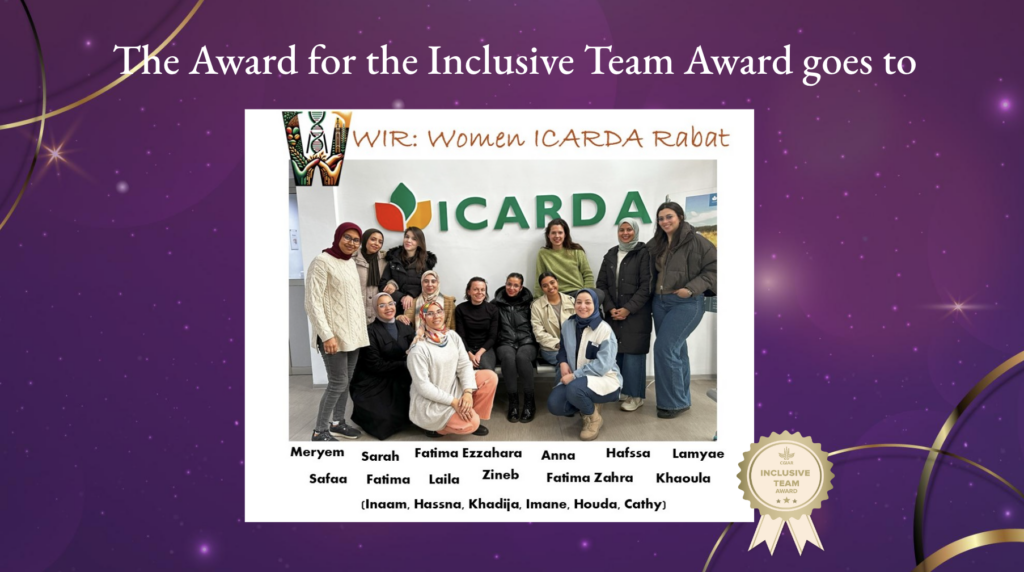Meet our Inclusive Team of 2024 – WIRs, ICARDA (Q&A)
- From
-
Published on
16.12.24

CGIAR’s GDI Oscars recognized star individuals and teams who have made significant contributions to Gender equity, Diversity and Inclusion in our workplaces during an online ceremony on 4 November 2024.
The award recipients have answered six questions for their CGIAR colleagues to get to know them better, learn about their motivations and role models.
The Inclusive Team Award went to the Women ICARDA Rabat (WIRs).
The WIR network came to life in 2023, when a PhD student, a research assistant, and a post-doc decided to formalize their efforts in closing the gender gap. Since then, the group grew to almost 30 women, working or studying at ICARDA-Rabat.
“As a group, our aim is to deliver a wide range of activities: Lead by women, open to everyone.”

WIR has enabled early-career scientists from ICARDA to attend the yearly Women in Wheat leadership training courses in 2023 and 2024. This exchange program is set to continue in 2025, in addition to other training events.
The network also organizes seminars, held by women, to support highlighting the capabilities of female researchers and give them more visibility.
“We encourage each other to be visible and speak up – at meetings and events – to gain a seat at the table,” read one nomination testimonial.
Meet the WIRs team
Where do the team members come from? Our team members hail from across the globe, with roots in Morocco, Tunisia, Germany, and the UK.
What languages do you speak?
Collectively, we speak a wide array of languages, including Arabic, French, English, German, and Spanish, reflecting the diversity that drives our inclusivity.
When did everybody join CGIAR and what are some key roles?
The team members joined CGIAR at various stages of their professional journeys, from internships to advanced research roles. Anna Backhaus, who joined in 2023, is a cereal pre-breeder working on improving the resilience of cereal crops. Hafssa Kabbaj and Houda Bousselham began their association with CGIAR in 2019, Hafssa as a Research Associate in genomic selection, and Houda as a PhD student specializing in durum wheat quality.
Safaa Ouahid joined in 2023, also as a PhD student, applying AI and remote sensing to agriculture. Leila Makhlouf’s journey started with internships in 2019 and 2020 before advancing to her current role as a PhD student in plant-pathogen interactions.
Tell us more about the team’s work.
Each team member contributes uniquely to CGIAR’s mission. From genomic selection and cereal breeding to exploring plant-environment interactions and leveraging AI in agriculture, our work spans various disciplines.
For instance, Dr Hafssa Kabbaj leads ICARDA’s durum wheat breeding program, leveraging genomic tools to combat climate challenges. Dr Anna Backhaus, a cereal pre-breeder, focuses on harnessing genetic diversity to improve resilience, while Leila Makhlouf delves into volatile organic compounds for eco-efficient agriculture.
Safaa Ouahid applies AI and remote sensing for sustainable agriculture, while Houda Bousselham blends cultural heritage with scientific research in durum wheat quality. Each story is a testament to passion and commitment.
“My favorite part is hands-on research and experimentation,” Leila shares, echoing the team’s love for making a tangible impact on global food security.

Which [scientist, researcher, thinker, leader, philosopher,…] working today do you admire most?
There are many exceptional thinkers and leaders working today, but a few stand out for their remarkable contributions and the inspiration they provide.
Hafssa admires Dr. Alison Bentley, who initiated the first Women in Crop Science network, exemplifying the power of informal networks in fostering diversity. She finds inspiration in Dr. Bentley’s work and leadership at ICARDA, as well as in Dr. Ismahane Elouafi, who has made a significant impact through her senior leadership roles at CGIAR.
Anna highlights Professor Beverley Grover, who leads the Cambridge Botanical Garden and conducts innovative research on floral evolution. Anna admires her rare combination of scientific brilliance, creativity, and kindness, which makes her a role model.
Houda points to Dr. Rajaâ Cherkaoui El Moursli, a Moroccan physicist who made significant contributions to the discovery of the Higgs boson and inspires young scientists by breaking barriers in a male-dominated field.
Safaa admires Andrew Ng for democratizing artificial intelligence education through accessible online courses, empowering learners worldwide. Safaa is also inspired by her supervisor, Dr. Miguel Sanchez Garcia, a scientist and barley breeder whose expertise and commitment to impactful agricultural solutions motivate her to keep learning and growing.
Together, these individuals represent a spectrum of excellence, innovation, and leadership.
What advice or guidance can you share with colleagues on how to foster an inclusive team?
Fostering an inclusive team requires intentional effort and a focus on open communication, mutual respect, and continuous learning. Dr Hafssa emphasizes the importance of open communication, tolerance, and respect for differing opinions.
Dr Anna highlights the need for kindness, listening, and avoiding rushed assumptions, especially under pressure. She advocates for building team structures that promote inclusivity, such as discussing how to make meetings more inclusive and seeking training in soft skills to ensure these practices are effectively implemented.
Safaa underscores the value of collaboration, openness, and understanding each person’s unique background. She suggests fostering trust, encouraging free idea-sharing, and acknowledging everyone’s contributions to create a safe and welcoming environment. Together, these insights underscore that inclusivity thrives on empathy, intentional structures, and ongoing growth.
About ICARDA
The International Center for Agricultural Research in Dry Areas Center’s provides innovative, science-based solutions for communities in the non-tropical dry areas of the developing world. Their important mission drives important research that actively contributes to reducing poverty and strengthening food and water security in the face of climate change. Learn more about ICARDA here.
